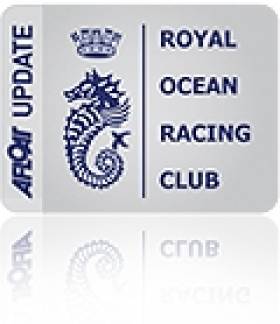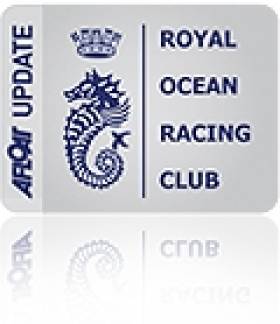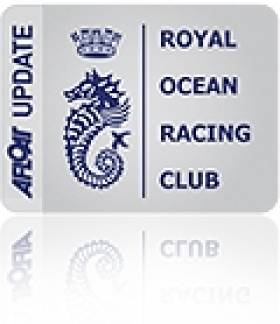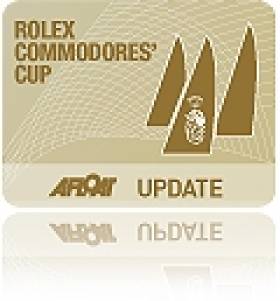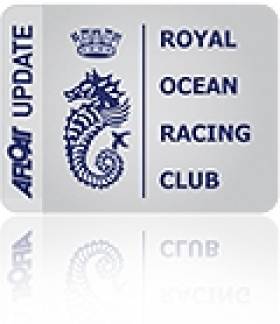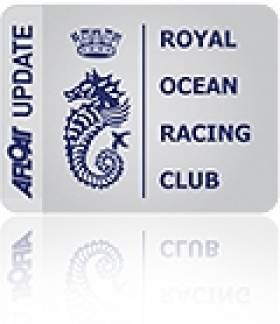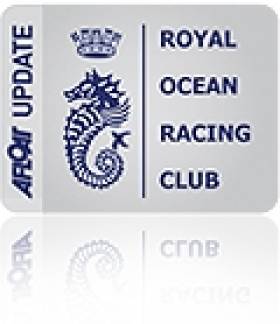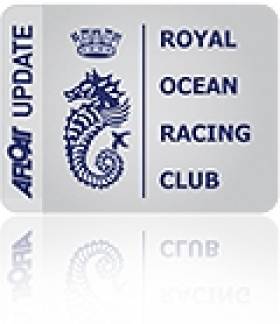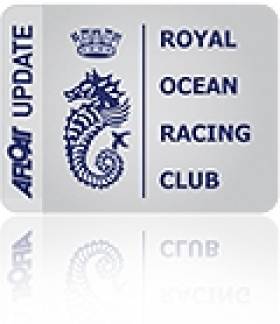Displaying items by tag: RORC
Cowes Dinard St Malo Sailing Race Preview
This year, the race will finish just outside St Malo; the medieval walled port will have well over 200,000 residents and visitors this weekend. RORC Racing manager Ian Loffhagen explained why the race will finish in the heart of the ancient town.
"After careful discussions with the French authorities and local experts, it was decided that we would bring the race to the French public. Yacht racing is incredibly popular in France and as the race will finish at the weekend and during peak holiday time, the competitors should receive a fantastic welcome. The route into the finish has been designed to avoid cross-tidal influences and has been used for the Quebec St Malo race, which involved large multihulls, so there should be no cause for concern with the RORC fleet. The St. Malo race should provide a real spectacle for thousands of people. We also hope that more of the competitors will come ashore and enjoy St Malo."
In IRC Zero Harm Prins' Volvo 60, Pleomax, is the highest rated boat and is in a three-way tussle with Derek Saunders' CM 60, Venomous, and Franck Noel's TP52 Near Miss. The wind may go light towards the end of the race and this would suit Near Miss's lighter displacement.
Twenty four yachts are entered for IRC One, including Piet Vroon's Ker 46, Tonnerre de Breskens, which is the current leader overall in the RORC Season's Points Championship. The St Malo race will see another interesting match with Jonathan Goring's Ker 40, Keronimo. Chaz Ivill's Grand Soleil 54, John B, and Mike Greville's Ker 39, Erivale III, are both having an excellent season and are also entered for the race.
In IRC Two 48 yachts are entered in what could be one of the most competitive divisions. Niall Dowling's J/111, Arabella, leads the class for the season but RORC Commodore Andrew McIrvine racing his First 40, La Réponse, is very much in contention. Ross Applebey's Oyster 48, Scarlet Oyster, has been very competitive in heavy airs racing this year; it will be interesting to see how they fair if the conditions are lighter.
Another hotly contested class racing to St Malo is IRC Three. Nick Martin's J/105, Diablo-J, currently leads the class for the RORC Season's Points Championship but Noel Racine's Foggy Dew is also competing and is always hard to beat.
Diablo-J's success so far is even more remarkable as the yacht is also sailed Two-Handed. In all 23 yachts will be racing to St Malo in the Two-Handed Class and the other contenders for the class are all competing.
IRC Four also boasts a large entry of 48 yachts. Matthias Kracht's Ultreia!, which is also a Two-Handed contender, is leading the class but most of the class contenders are also doing this race.
RORC Commodore, Andrew McIrvine has special reasons for racing to St Malo.
"It is probably my favourite race, it was the first offshore race I ever did and I have won various trophies on different boats but it is always difficult to fight off the very strong French challenge. This weekend on La Réponse, I will be sailing with friends who have also done the race many times. My good friend, Roger Raven has flown back from Greece, just for the race. Besides winning, our other goal will be to beat the tide and get through the lock for dinner in the Duchesse Anne, in the heart of this fascinating port."
Lyver Race Report - Holyhead to Howth
Following very closely after the Dingle Race, ICRA Nationals in Crosshaven and the Sovereign's Cup in Kinsale, it was understandable that the numbers of ISORA boats taking part in the Lyver Race was small. The "grim" forecast of no wind did not encourage any boats to take part either. Never the less, five ISORA boats joined the 10 other boats and came to the start shortly after 19.00 on Friday the 1st July.
In view of the forecast the Sailing Committee shortened the race to the minimum requirements of RORC to qualify for the Fastnet Race – 75 miles. The time limit for the race was 24 hours after the start. With little wind at the start, and a north going tide just starting, they chose a "waypoint" just south of the Isle of Man as the turning mark and then to Howth.
This decision turned out to be inspired. The little wind there was there at the start was from the north-west so the first leg was a beat to the waypoint. Those boats who took the north leg from the start shot away in the tide while the others appeared to remain static in
Holyhead Bay. The forecast was for the wind to veer around to the south later. All through the night the winds were very fickle and boats had the chase constantly fluctuating breezes. Despite the little wind, it held for most of the night. At day break the wind started to pick up from the forecasted South and boats popped their kites and headed for the waypoint. There was a great gathering of boats at the waypoint with 12 boats visible around the waypoint.
The next leg to Howth was a white sail reach. This turned out to be an intensive chase with the J111 "Arabella" taking the lead followed by two Prima 38's, Stephen Tudor's "Sgrech" and Matt Davis's " Raging Bull". The wind from the south increased in strength as the fleet approached Howth.
While "Arabella" took line honours, it only managed to take 2nd place overall. "Sgrech" took 1st place and "Raging Bull" took 3rd place. All the boats that had not retired, managed to complete the course within the time limit.
The boats taking part in the race were fitted with trackers. The progress of the race can be followed by clicking the following link: http://live.adventuretracking.com/lyver2011
The prize-giving took place in Howth Yacht Club on Saturday evening.
Bad weather is being blamed for two separate offshore sailing accidents at the weekend, one of which led to the death of a yachtsman.
A 46-year-old London man died after falling from a yacht competing in a race from Cowes to France.
At home, five yachtsmen had escaped harm when their craft hit rocks off the west coast at the weekend.
The 46-year-old British sailor lost his life after falling overboard during the race, which started in Cowes at 1900 on Friday night. It is understood that the accident took place approximately 17 miles South East of the Isle of Wight.
A RORC statement says "It is with great regret that the Royal Ocean Racing Club has to report a tragic loss of life during the RORC Morgan Cup race from Cowes to Cherbourg".
The Coastguard and Lifeboat services were called to assist the crew who recovered the man but were unable to revive him.
The boat returned to port in the UK overnight.
The yacht was one of seventy-two experienced offshore race boats taking part in the race.
Off Galway, yachtsmen competing in the overnight 'Round Aran race' were forced to abandon off the coast of Galway when their yacht hit rocks early on Saturday morning. The men, all experienced sailors, made it to land after they launched a life raft and raised the alarm.
Dowling to Miss Battle to Cherbourg
The RORC Season's Points Championship continues this weekend with what looks like a tough race to Cherbourg writes Louay Habib.
Although Dun Laoghaire's Niall Dowling's J/111, Arabella currently leads the class for the season he is not competing in the Morgan Cup this weekend. Dating back to 1929, the solid silver trophy is one of the oldest and most prestigious prizes. But the 100-boat fleet may have to battle against strong winds to reach Cherbourg.
Weather models are predicting a wet beat to Cherbourg; it could well suit those yachts and crew that can best handle the tough conditions. Tactical weather expert Mike Broughton will be in the afterguard of pocket rocket Keronimo for the race.
"A large area of low pressure has been stationary 200 miles west of Ireland all week. By Friday morning it looks like a secondary low pressure system will be riding around its southern flank, moving like a slingshot towards the south western approaches. There will be gales in the western channel with Force 6/7 in the central channel from the westerly quadrant. However, it all depends on the final track of this system; even a little change in its direction will make a big change in the conditions for the race. It certainly looks like being windy on Saturday morning with potentially 25 to 30 knots from the west at dawn. If the low pressure system tracks south or intensifies, we could see significantly more wind and a difficult sea state," commented Broughton.
IRC Zero will be a match race between two high performance racing yachts: Derek Saunders' Venomous and Rob Gray and Sam Laidlaw's Bob. IRC One could well be a skirmish between Piet Vroon's Ker 46, Tonnerre de Breskens, and Jonathon Goring's Ker 40, Keronimo. However Chaz Ivill's Grand Soleil 54, John B, and Mike Greville's Ker 39, Erivale, are also proven race winners.
IRC Two has 32 yachts entered and the largest class could probably be described as the most competitive racing to Cherbourg. Niall Dowling's J/111, Arabella currently leads the class for the season but is not competing in the Morgan Cup. However, RORC Commodore Andrew McIrvine's First 40, La Réponse will, no doubt, be in fierce competition with Neil Kipling's J/122 Joopster. They are currently second and third in IRC Two. IRC Two has a wide variety of well-sailed boats including ten First 40.7s who will also have their own private battle. IRC Three has eleven J/109s racing, and they are fast exciting boats; especially off the breeze. However this race looks like it could well favour the heavier displacement boats.
The current holder of the Morgan Cup is John Loden's HOD 35, Psipsina, who looked back at last year's race with fond memories. "Absolutely elated and very surprised to win!" exclaimed John. "My co-skipper Paddy and I knew that we had won the Two-Handed Class but we had no idea that we had won the race overall until we went for a beer in the yacht club bar. I have been racing double handed for eight years and I am delighted to see the class is becoming so popular. To do well, it is very important that the boat is well set up; this allows you to concentrate on sailing rather than fixing problems. It gave us immense satisfaction to win the prestigious cup last year, we had never set out to win overall but it just shows that everybody has a chance."
Seventeen yachts are entered in the Two-Handed Class. Nick Martin's J/105, Diablo-J, leads the 2011 Season's Points Championship with Matthias Kracht's JPK 9.6, Ultreia!, lying second. The Le Havre based Ultreia! will be looking to continue their winning ways, having won class and second in IRC overall in last month's Myth of Malham Race.
RORC Racing Manager Ian Loffhagen believes that heavy weather sailing experienced this season by the competitors has provided ideal preparation for the highlight of the championship, the forthcoming Rolex Fastnet Race.
"The Morgan Cup Race is the seventh race of the RORC Season's Points Championship and nearly all of them have been tough. Many of the yachts competing this weekend will be taking part in the Rolex Fastnet Race," commented Loffhagen. "The Club's Notice of Race clearly states that each yacht shall exercise her responsibility under RRS Fundamental Rule 4 and decide whether or not to start or to continue to race. The responsibility for a boat's decision to participate in a race or to continue racing is hers alone."
The Morgan Cup Race starts at the Squadron Line at 1900 BST on Friday June 17th. Late Entries are possible until Thursday 16th 1900 BST.
RORC Clarifies Commodores' Cup Rating Band Rules
London's Royal Ocean Racing Club (RORC) has moved tonight to clarify details of today's announcement for the 2012 Commodores' Cup at Cowes.
In a statement the club says 'Following the press announcement earlier today re. Advance Notice of the 2012 Commodores' Cup, please find below clarification of the statement concerning rating bands.
In the sentence: 'Three boats can be chosen from this rating band with the proviso that only one boat in the team shall rate 1.150 or above...' 'Shall' should be substituted with 'may'.'
The statement adds:
"It is the intention that teams can choose three boats from the rating band 1.020 to 1.230. It is NOT necessary for them to have a boat rating 1.150 or above as the wording may have suggested".
Vroon's Ker 46 Makes Victorious Start to the RORC Season
Irish boats – or at least those with strong Irish connections – were to the fore in this weekend's Royal Ocean Racing Club Solent fixture, the De Guingand Bowl race providing another exciting chapter in the 2011 RORC Season's Points Championship.
Last year's Round Ireland race winner Piet Vroon's Ker 46, Tonnerre de Breskens, made a victorious start to the RORC European circuit with a triumph in IRC One and IRC overall to lift the De Guingand Bowl Trophy.
In class two Dun Laoghaire's Niall Dowling was third in his new J111 Arabella and in the two handed class Paddy Cronin's Psipsina had a big battle for third place.
The RORC Race Committee decided to send the fleet on an upwind start, westward out of the Solent, before turning east, down the south side of the Isle of Wight and offshore after St. Catherine's Point, to a top mark mid-Channel: the Greenwich Light Vessel. The fleet then turned for home, a gruelling 50-mile upwind leg to finish back in the Solent. Most of the fleet enjoyed a tactical race with many twists and turns along the way.
"The course of roughly 127 miles was designed to give the fleet options. To make the most of tides but also giving them the opportunity to go offshore in search of more wind on several occasions during the race. These factors changed throughout and kept the competitors focused on tactical decisions, as well as boat handling," commented RORC Racing Manager, Ian Loffhagen.
The start off the Squadron Line was a gentle one with ten knots from the northwest, however as the fleet entered the Western Solent big gusts and wind shifts had the fleet concentrating on sail trim. The breeze built as the fleet turned east and with an increased sea state, the competitors in the De Guingand Bowl Race enjoyed some fast running conditions before blasting offshore bound for the Greenwich Light Vessel. With blues skies punctuated by scattered clouds, the 71-strong fleet enjoyed a day of fantastic offshore action. Just before sunset, the breeze shifted north and colder air, often in excess 20 knots, gave a chilling night sail. By dawn the breeze had abated somewhat and returned to the northwest and by early afternoon, the majority of the RORC fleet had been accounted for.
Vroon's Ker 46, Tonnerre de Breskens, made a victorious start to the RORC European circuit with a triumph in IRC One and IRC overall to lift the De Guingand Bowl Trophy.
"We have a great crew who handled themselves very well but the race was not a straight forward one and we have certainly got plenty to think about before our next race," commented Piet Vroon dockside after the race.
"We could see the Farr 52, Bob, for most of the race and they were a good indicator for us about the conditions ahead. It is still early in the season but I am very happy with our result and the performance of the crew."
Gray and Laidlaw's Bob took line honours and second place overall by the narrow margin of just over four minutes on corrected time. Chaz Ivill's Grand Soleil 54, John B, had another excellent race, to place third overall and second in IRC One. John B is currently third overall for the championship.
Quokka 8 corrected out to win IRC Two, this season Peter Rutter's Grand Soleil 43 is crewed by Phillippe Falle and the team from Sailing Logic. "It is great to have Peter on board, as he has vast experience and knows the yacht so well," commented Phillippe Falle. "However, Quokka is very different to the Reflex 38 that we campaigned last year and not quite as forgiving. We found that to our cost, some 15 miles offshore when we Chinese gybed. It took a while to get going again but the crew were magnificent, hiking to the maximum throughout the night. We had an excellent beat back to the Solent, with great trimming from the crew. We also capitalised by going the right way on a big right hand shift, just before sunset. We are absolutely delighted to get off to such a great start, a big thank you to Peter and all of the Quokka crew, we are really looking forward to the season ahead."
RORC Commodore, Andrew McIrvine's First 40, La Réponse, continued their impressive start to the season taking second place in IRC Two, to lead the class for the championship. Niall Dowling's J111, Arabella, placed third to keep up the pressure at the top of the class.
Noel Racine's French JPK 10.10, Foggy Dew, was once again in sparkling form, holding off an admirable challenge from Peter Olden's A 35,Solan Goose of Hamble, to win their second race in a row by just over 10 minutes on corrected time. Foggy Dew is based in Le Havre and besides racing over 127 miles, Noel and his crew had to deliver the yacht to the race and sail back home, requiring nearly 400 miles of sailing.
IRC Four produced the closest finish in the 71-yacht fleet. Fabrice Tropres' Dufour 34, Major Tom, had a virtual photo-finish with Harry Heijst's S&S 41, Winsome. Major Tom won the class by just 19 seconds. Mathias Kracht's JPK 9.6, Ultreia!, was not far behind in third, racing two-handed.
There were 14 yachts racing in the Two Handed Class. Paddy Cronin's, Psipsina had an intense battle for third place with Matthias Kracht'sUltreia! But Peter Olden's Solan Goose of Hamble, corrected out to win the class and retain the class lead for the season so far, with Jammy Dodger coming in second behind them.
"I am planning on competing in all of the Offshore RORC races in the British Isles this season, after a positive experience in 2010," commented Peter Olden. "Solan Goose is based in Hamble, we were runner up in the RORC Two-Handed division in 2010. Both my partners for the season are very good dinghy sailors with good offshore experience, gained with me. I am organising a 1000 mile solo race in 2012 in association with the Solo Offshore Racing Club but the RORC Season's Points Championship is very much the focus this year."
Racing continues for the RORC Season's Points Championship on the 20th May with the East Coast Race, there will be plenty to celebrate in Burnham on Crouch as this year is the Centenary Houghton Cup.
The prizegiving for the Cervantes Trophy, Guillaume le Conquérant and De Guingand Bowl races will be held on Tuesday 17th May 2011 at 1930 at the RORC Clubhouse, London. All crews welcome.
The Royal Ocean Racing Club's Season's Points Championship consists of a testing series of races, which attracts an international and varied fleet. For the serious offshore sailor, trying to win the Season's Points Championship is a real challenge. The Season's Points Championship this year includes the tactically and physically challenging Rolex Fastnet Race, the oldest and most prestigious offshore yacht race in the world.
2010 Round Ireland Race winner Piet Vroon's custom Ker 46, Tonnerre de Breskens, returns to RORC racing after winning her class at this year's RORC Caribbean 600. The sky blue flyer, which was RORC Yacht of the Year for 2010, has undergone some rig and sail modifications in Breskens before arriving in Hamble this week to continue their racing programme, leading up to the Rolex Fastnet Race this August.
Chaz Ivill's Grand Soleil 54, John B, won IRC One in last month's Cervantes Trophy Race. "John B will be competing in six RORC races this year, including the Rolex Fastnet Race," explained Chaz Ivill. "Competing in the De Guingand Bowl is just part of this year's offshore program. The core crew has been very successful and has been together for five years, this will be our third Fastnet campaign on the trot. However, John B has a blend of youth and experience and we have three sailors new to offshore sailing. Sam Cooper is just 18 and a student, Nathan Hanley is 22 and a sailmaker and Matt Mills has just finished University and is the son of regular crew, Tim Mills. Also William Broughton will be joining us this week for his first race on John B, William is eighteen and studying at Plymouth University."
RORC Commodore Andrew McIrvine's First 40, La Réponse, won class in the Cervantes Trophy Race. McIrvine's crew are all friends with no professionals on board. "Jason Owen will be the skipper for the De Guingand Bowl Race, fresh from winning the Etchells Class in Bermuda," commented Andrew. "Jason is highly experienced but not all of the crew are; Tame Welsh has done very little sailing but has rowed across the Atlantic and Indian Oceans and is also a PhD nurse." McIrvine's La Réponse can expect a close battle with another First 40, Guy Prest's Tarka II of Hamble, which should provide a close duel. Neil Kipling's J/122, Joopster, is also in fine form.
IRC Two also contains several First 40.7s, including Trevor Drew's Blue Juice, representing the Civil Service Offshore Racing Club.
"The CSORC has a long history as a club, with one of its first races being the 1979 Fastnet," explained Trevor Drew. "The emphasis is on having fun, with a friendly atmosphere. There is no minimum level of experience to sail with the club but the offshore crew has now completed the RYA Sea Survival and the ISAF Offshore Safety Course. We've been out on Blue Juice, getting in some team practice in the Solent and offshore. Our aim is to learn as much as we can and hopefully winning will come later."
Two-handed racing is becoming an extremely popular discipline within the RORC Season's Points Championship and fourteen yachts will be competing this weekend. Racing short-handed requires an all-round sailing ability and the class attracts a wide variety of people.
Kirsteen Donaldson and Judith Eastwood make up the all-girls team on X 332, Pyxis. Between them they have racked up thousands of sea miles including races from The Solent to La Trinité and Santander but Kirsteen is happy that the De Guingand Bowl Race will finish in the Solent.
"Previously, I would have preferred races that could be used as a feeder for a holiday. However, my sailing partner's husband is not keen on sailing and my 'other half' is not keen on long passages home, so finishing near where we started allows us to get a good sail into a weekend most diplomatically!"
Frederic Waniart and crew are the two-handed team in form, having won the Cervantes Trophy Race last time out. Vim is one of the oldest boats competing but has been meticulously prepared by the French team. The legendary Paul Elvström designed the Aphrodite 101 in 1977.
"We will be racing the De Guingand double handed, as part of our season racing with RORC and also the UNCL double handed series," explained Frederic Waniart. "One lawyer and one surgeon who have been sailing friends for quite some time. As for experience, it is my fourth season with the RORC in double handed sailing. I love racing with the RORC because there is a real competition, and the courses are very well organised."
The Royal Ocean Racing Club's Season's Points Championship consists of a testing series of races, which attracts an international and varied fleet. For the serious offshore sailor, trying to win the Season's Points Championship is a real challenge. The Season's Points Championship this year includes the tactically and physically challenging Rolex Fastnet Race, the oldest and most prestigious offshore yacht race in the world.
RORC Fleet Blast to Le Havre
The majority of the fleet completed the 125-mile course in less than 20 hours. Gray and Laidlaw's Farr 52, Bob, took line honours by nearly three hours and won the Cervantes Trophy for best yacht overall on corrected time.
"We had a great Cervantes," explained Bob's trimmer and driver, John Brinkers. "The blast reach in fresh conditions was very exciting. We had 29 knots of breeze at one stage, blasting along under jib top and genoa staysail on the leg from Nab Tower to the buoy off Le Havre. As we came off one big wave, the boat accelerated to just under 22 knots with big whoops from the crew. All credit to skipper Brett Aarons and the Bob team for impressive crew work. They did a great job."
Charles Ivill's Grand Soleil 54, John B corrected out as winner of IRC One. Two First 44.7s had a close battle for second in class. John Stapleton's Vespucci's Black Sheep eventually took the runner up spot in IRC One. Andrew Arthur's Koko Kai was third. The class also contained four identical Challenge 72s competing for the Tall Ships Youth Trust. Stephen Durkin's Challenger 4 was first home in an elapsed time of just over 18 hours. The Tall Ships Youth Trust is dedicated to the development of training young people through sailing and the Cervantes Trophy Race was part of their preparation for the Rolex Fastnet Race later this year.
RORC Commodore Andrew McIrvine scored his first win of the season, taking IRC Two in his First 40, La Réponse. Neil Kipling's J 122, Joopster enjoyed the fresh conditions to claim second place in class but by less than two minutes on corrected time from X 40, Exception, owned by Frenchman Patrick Ponchelet.
Noel Racine's JPK 10.10, Foggy Dew, won class in the Cervantes Trophy for the second year running. Enjoying the big breeze, the Le Havre based yacht was the first boat home in IRC Three and class winner on corrected time. William Hutchinson's Dutch Ff110, Fandango, had a high-speed surfing duel with David Aisher's J/109, Yeoman of Wight, crewed by the British Keelboat Academy. Fandango took second place by just 23 seconds on corrected time.
IRC Four was decided by just 30 seconds on corrected time with two French yachts battling it out. Philippe Rios' Dufour 34, Gwaihir Ventur won the class with Frederic Waniart's Aphrodite 101, Vim, second. Dorset-based Ian Braham, at the helm of his MG 346, Enigma, was third.
19 yachts raced to Le Havre Two-Handed, nearly double the amount from last year's Cervantes Trophy Race. Vim scored a memorable win, beating Rolex Fastnet winner, the X 35 Exile/Mirabaud, skippered by Nicolas de la Fourniere. Peter Olden's A 35, Solan Goose of Hamble, was third.
After enjoying the warm hospitality of Le Havre, competitors returning to Cowes enjoyed a race back across The English Channel. The Trophée Guillaume Le Conquérant is organised by the Société des Régates du Havre in association with the Royal Ocean Racing Club and the Island Sailing Club.
Racing resumes for the RORC Season's Points Championship on the 14th May with the De Guingand Bowl Race.
Provisional Results:
IRC OVERALL
1. Bob, Farr 52, R Gray & S Laidlaw
2. John B, Grand Soleil 54, Charles Ivill
3. La Réponse, First 40, Andrew McIrvine
IRC ZERO:
1. Bob, Farr 52, R Gray & S Laidlaw
IRC ONE:
1. John B, Grand Soleil 54, Charles Ivill
2. Vespucci's Black Sheep, First 44.7, John Stapleton
3. Koko Kai, First 44.7, Andrew Arthur
4. Challenger 4, Challenge 72, Tall Ships/Stephen Durkin
IRC TWO:
1. La Réponse, First 40, Andrew McIrvine
2. Joopster, J 122, Neil Kipling
3. Exception, X 40, Patrick Ponchelet
4. Arabella ,J 111, Niall Dowling
IRC THREE:
1. Foggy Dew, JPK 10.10, Noel Racine
2. Fandango, Ff110, William Hutchinson
3. Yeoman of Wight, J 109, David Aisher/British Keelboat Academy
IRC FOUR:
1. Gwaihir Venturi, Dufour 34, Philippe Rios
2. Vim, Aphrodite 101, Frederic Waniart
3. Enigma, MG 346, Ian Braham
IRC TWO-HANDED:
1. Vim, Aphrodite 101, Frederic Waniart
2. Exile/Mirabaud, X 34, Nicolas de la Fourniere
3. Solan Goose of Hamble, A 35, Peter Olden
CLASS 40:
1. MAXVMG, Class 40, Mark Denton
2. Partouche, Class 40, Christophe Coatnoan
Niall Dowling's New J111 among 100 Boats Bound for Le Havre
The majority of the RORC fleet for the Cervantes Trophy is an eclectic mix of performance cruising boats. Gray and Laidlaw's Farr 52, Bob, is the scratch boat on handicap but will be on a very busy start line festooned with canvas. Four examples of the Tall Ships Youth Trust's Challenge 72 are entered and will be hoping for fresh conditions. John Stapleton's First 44.7, Vespucci's Black Sheep, was second in class last year and may well feature in the results.
IRC Two has no less than 20 types of yacht including RORC Commodore Andrew McIrvine's First 40, La Réponse. The much travelled Niall Dowling will be racing his new J/111, Arabella for the first time and could have a close battle for line honours in class with Maxime de Mareuil's X 41, Orange mecaniX and Sean Hurst's A 40, Stamina II. Five First 40.7s including Steven Anderson's Encore and Peter Robson's Trustmarque Playing Around are racing within the class.
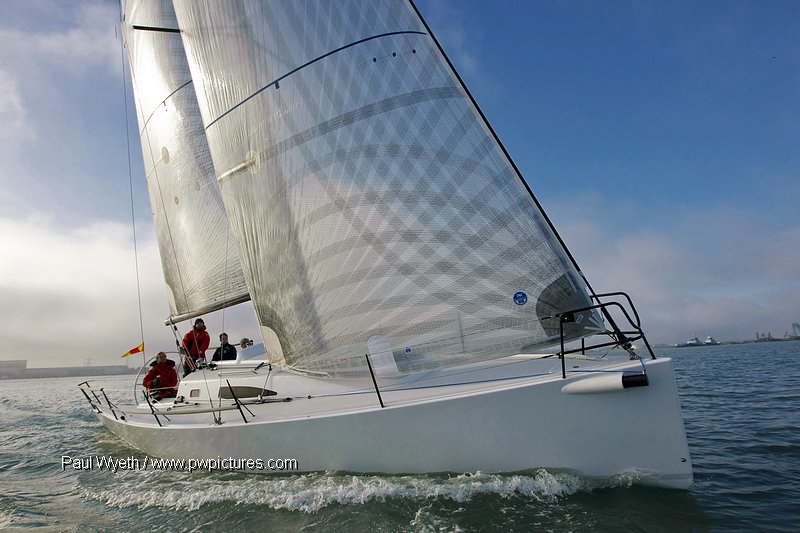
Niall Dowling's J111, Arabella will be making its offshore debut in the RORC Cervantes Trophy Race starting on Saturday 30 April 2011. Photo:Paul Wyeth
An impressive line up in IRC Three has nine J/109s, including proven competitors such as Robin Taunt's Jibe and Paul Griffith's Jagerbomb. Noel Racine's JPK10.10, Foggy Dew is one of the smallest entries, but the Frenchman and his team often punch well above their weight and came out class winners for the 2010 season.
The Two-Handed Class, an increasingly popular discipline, has attracted nine yachts for The Cervantes Trophy Race, including 2009 Rolex Fastnet class winner Nicolas de la Fourniere with his X 34, Exile/Mirabaud and Rear Commodore Nick Martin's J/105, Diablo-J which won the Cherbourg Race at the end of the 2010 season.
The largest class for The Cervantes Trophy Race is IRC Four with 39 yachts set for the race across the English Channel. Dutchman Harry Heijst's S&S 41, Winsome was class winner of the 2010 Sevenstar Round Britain and Ireland Race. Jean Yves Chateau's Nicholson 33, Iromiguy was in fine form last year, winning their class for the RORC Season's Points Championship. However, there are many extremely successful and well-sailed boats in this class.
One of the appealing features of the RORC Season's Points Championship is that a huge variety of boats have claimed class and overall victory over the years.
Late Entries possible until 29th April 2011 08:00 BST.
For more information visit the Royal Ocean Racing Club at: www.rorc.org
Irish boats Post Mid-fleet Results on the Solent
There were mid fleet performances from Irish boats at RORC's Easter Sailing Challenge on the Solent where competitors not only head home wiser after three days of coaching, but also with suntans...so the July-like conditions continued for Easter Sunday, the final day of competition.
Royal Cork's Anthony O'Leary was fifth from ten starters in IRC one and Niall Dowling's new J111 Arabella finished the same in IRC 2. Both boats moved up from sixth overall in yesterday's final day of racing.
Racing got underway in the morning with just enough northwesterly gradient coming out of Southampton Water for the race committee to set courses to the north of Ryde Sands. The first race was held in 5-10 knots while in the second, the breeze dropped off after the second start.
Despite a protest over their start in today's second race that might have cost them the top spot, Rob Gray and Sam Laidlaw's Farr 52, Bob, won IRC 1 by a comfortable four points, the biggest boat in the RORC Easter Challenge fleet benefitting from clear air in the light winds.
Mike Bartholomew's King 40, Tokoloshe, had a disappointing day posting two fourths, dropping them to second. "It was thoroughly enjoyable, a great regatta, although it was a pity the wind got a bit fickle at times," said the South African skipper. "I think it was quite funny that we are one of the lowest rating boats in our class and we ended up second while the top rating boat won. There has been a lot of criticism of the IRC, so maybe it works! And the weather was beautiful. I don't live here all the time, but I have never seen England so good."
Mark Devereux's Club Swan 42, Brevity, slipped into third today after the British Keelboat Academy's Farr 45, Kolga, was OCS in today's second race. Kolga has British Keelboat Academy crew with RYA Youth Match Racing National Champion Mark Lees, 19, steering.
"For us it was a case of our making sure that all the fundamentals we've been working on in the manoeuvres and the communications on board were all clicking," commented British Keelboat Academy Head Coach, Luke McCarthy. "In the first race today it all came together and it was nice to get second on corrected in a pretty competitive IRC fleet."
In IRC 2, RORC Commodore Andrew McIrvine was in his stride, scoring two wins aboard his First 40, La Rèponse. This left him tied in first with Andrew Williams' Prima 38, Max 'Ed Out! which won having one more bullet.
The scorers also had to resort to countback in IRC3 where Chris and Hannah Neve's First 35, No Chance, was pipped at the post by Louise Morton's MAT 1010, which had two wins today to gain the all-female crew (apart from Volvo Ocean Race winner navigator Jules Salter) the overall prize on countback.
No Chance's tactician Phil Lawrence, grumbling that his match racer daughter Charlotte aboard MAT 1010 had beaten him, said that in the second race their chances were scuppered when they got gassed by the J/109, Toe in the Water, led by round the world sailing legend, Brian Thompson. "There was much less breeze and we are not so quick in that and Toe In the Water, which has been sailed really well, got past us and dropped us back into the pack. We could just never catch them."
The regatta's only run-away leader was Grant Gordon's J/97 Fever. She finished 16 points ahead of Robert Baker's X-332, Brightwork, despite losing today's final race to Alistair Evans' immaculate Swan 37, Alvine XV, winner of the Prix d'Elegance (as chosen by the ladies on the committee boat).
Following on from Gordon's Swan 45 of the same name, the J/97 is being sailed by a new team that has been together since last Cowes Week.
"It has been very well organised by the RORC," continued Gordon. "They have done a good job and it is great to get feedback from the coaches. We got some good input on trimming the sails from Eddie Warden Owen, and being so light, the starts were quite challenging. It is a great way to start the season and it is much better to do it when there is a heat wave. Last year, we were sweeping snow off the deck!"


























